Tree House Brewing Co. co-founders deny minority shareholder’s lawsuit claims
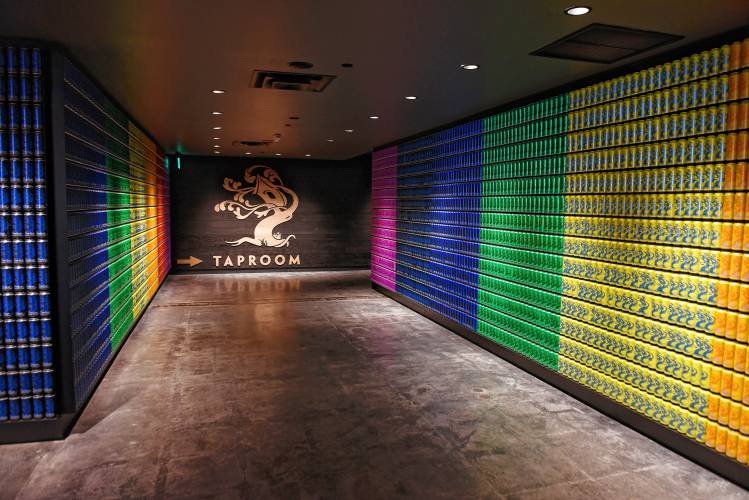
The hallway to the taproom at Tree House Brewing Co. in Deerfield is lined with cans and the company’s history. STAFF FILE PHOTO/PAUL FRANZ
| Published: 01-03-2024 3:02 PM |
SPRINGFIELD — Tree House Brewing Co.’s majority owners have filed a formal response to a lawsuit brought by the brewery’s only minority shareholder, denying allegations of a breach of fiduciary duty.
In documents filed in Hampden County Superior Court on Dec. 21, Tree House co-founders Nathan Lanier and Damien Goudreau denied allegations laid out by 2% minority shareholder Eric Granger, who claimed the owners paid themselves “excessive” salaries, secretly invested in real estate and caused him to suffer “financial harm” in the process. Granger is the only minority shareholder left. Other shareholders have previously redeemed their shares.
“Tree House denies that Granger or any other shareholder was ever deprived of financial benefit from ownership of Tree House shares,” the response filed by Boston-based lawyer William Paine reads. “Tree House maintains, accordingly, that Granger’s sworn assertion that Tree House’s shareholders other than Granger ‘continue to deprive’ him ‘from enjoying any real financial benefit’ from owning his shares is materially false; and that his sworn assertion that there has been a ‘historical refusal to issue dividends to shareholders’ is utterly false.”
Alongside the company’s response, Lanier and Goudreau both filed a motion to dismiss the lawsuit. If that motion is denied, they are seeking a trial by jury, likely in 2026, “on any issue so triable.”
Granger, who Lanier and Goudreau said has never been employed by Tree House, alleged the brewery owners declined to hold minority shareholder meetings and provide financial documentation to Granger, investing more than $13 million into real estate under two joint limited liability companies without disclosing it to fellow shareholders and withholding tax documentation.
The owners, however, refuted Granger’s claims and noted that while Lanier and Goudreau made more than $4 million from 2017 to 2020, they offered to purchase his shares twice, which he declined to accept and instead demanded “approximately 10 times the amount per share greater than the fair market value” on the initial offer, before again declining and demanding “twice the amount per share” in 2023.
“In connection with his counterproposal, Granger threatened litigation if his unreasonable demand was not accepted,” the response reads. “Tree House has provided Granger with access to highly confidential, proprietary and competitively sensitive information regarding the company’s operations, finances, financial performance, business plans and more.”
Lanier and Goudreau also highlighted the large profits Granger has earned from his initial $10,000 passive investment in 2012, with the minority shareholder receiving “over $850,000 in distributions from Tree House.”
Article continues after...
Yesterday's Most Read Articles
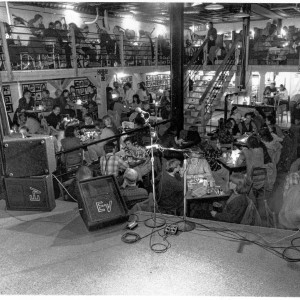 The Iron Horse rides again: The storied Northampton club will reopen at last, May 15
The Iron Horse rides again: The storied Northampton club will reopen at last, May 15
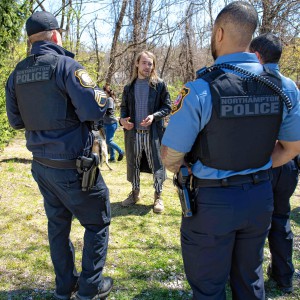 Homeless camp in Northampton ordered to disperse
Homeless camp in Northampton ordered to disperse
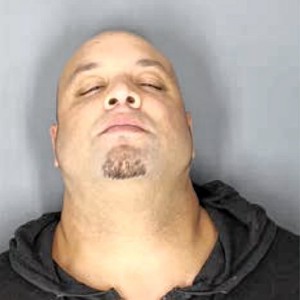 Authorities ID victim in Greenfield slaying
Authorities ID victim in Greenfield slaying
 $100,000 theft: Granby Police seek help in ID’ing 3 who used dump truck to steal cash from ATM
$100,000 theft: Granby Police seek help in ID’ing 3 who used dump truck to steal cash from ATM
 UMass football: Spring Game closes one chapter for Minutemen, 2024 season fast approaching
UMass football: Spring Game closes one chapter for Minutemen, 2024 season fast approaching
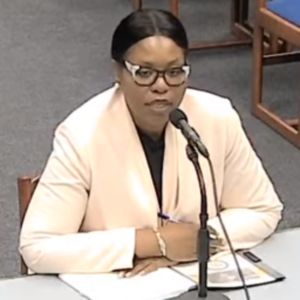 Final pick for Amherst regional superintendent, from Virgin Islands, aims to ‘lead with love’
Final pick for Amherst regional superintendent, from Virgin Islands, aims to ‘lead with love’
Additionally, the founders note that in an Oct. 3 letter — more than a month before the November lawsuit was filed — a letter was sent to Granger informing him that the company would start to issue $5,000 payments quarterly, which is a “200% annual return (each year into the indefinite future) on his $10,000 passive investment.”
Lanier and Goudreau also pushed back on claims they secretly created two LLCs for land acquisitions that would have cut out investors. Instead, they said the creation of Landreau Realty LLC and Pride and Purpose LLC was to “remove liabilities that would otherwise fall on Tree House.”
In the same vein, Granger claimed the LLCs were created “without disclosing” them to the remaining Tree House shareholders and they only revealed the LLCs in 2022 when Granger sent a shareholder demand letter.
Tree House’s founders, however, stated the annual shareholder meetings in 2016, 2017 and 2018 provided attendees with financial and other operating information about the company and, in 2016, shareholders discussed Landreau Realty LLC. Tree House showed this by providing meeting minutes, noting Granger’s attendance and that there was a discussion about the LLC.
Lanier and Goudreau also denied allegations that they forged information in a background check for Granger. They say they submitted a prior Criminal Offender Record Information (CORI) “with no alteration of his signature, of the date of signature or of the notary’s dated signature” because Granger allegedly refused to provide a signed form in April 2022 — when the company was preparing license applications in Deerfield — without a condition that “he be provided information to which he was not entitled.”
“Granger’s refusal to complete ministerial acts having no cost or impact upon him without concessions to which he was not entitled was a breach of his fiduciary duty,” the response reads. “Tree House mitigated the harm that would have been caused by Granger’s refusal to submit the form and caused no harm thereby to Granger.”
Chris Larabee can be reached at clarabee@recorder.com.

 Authorities ID victim in Greenfield slaying
Authorities ID victim in Greenfield slaying  Federal probe targets UMass response to anti-Arab incidents
Federal probe targets UMass response to anti-Arab incidents Locking up carbon for good: Easthampton inventor’s CO2 removal system turns biomass into biochar
Locking up carbon for good: Easthampton inventor’s CO2 removal system turns biomass into biochar William Strickland, a longtime civil rights activist, scholar and friend of Malcolm X, has died
William Strickland, a longtime civil rights activist, scholar and friend of Malcolm X, has died
